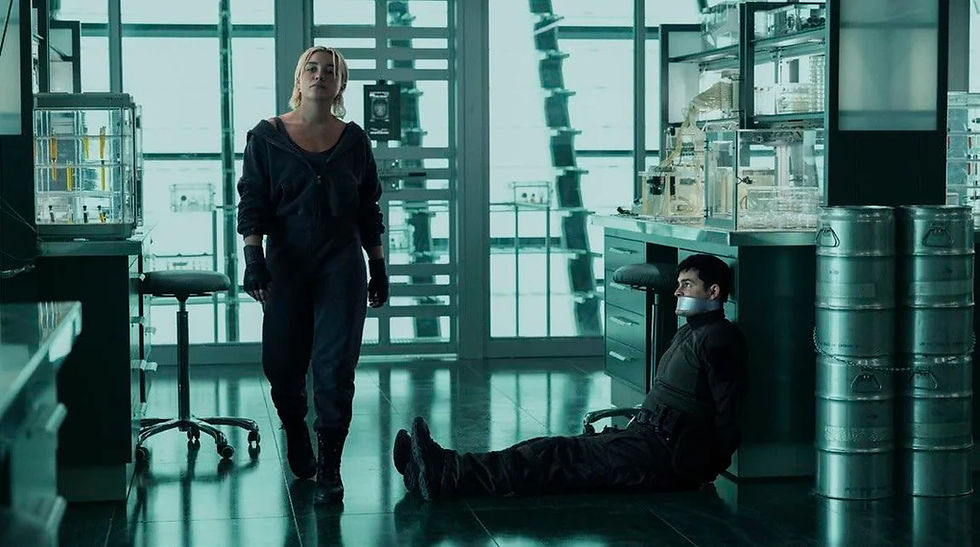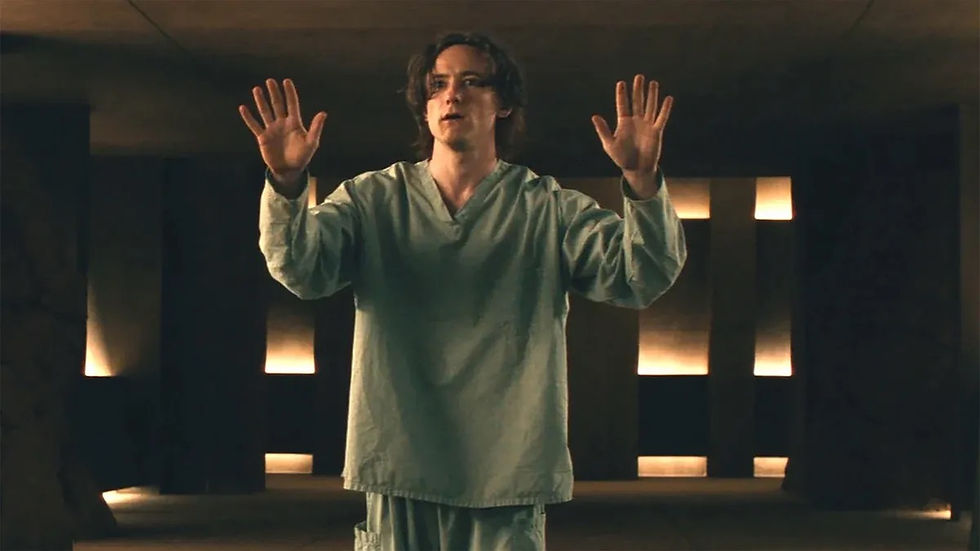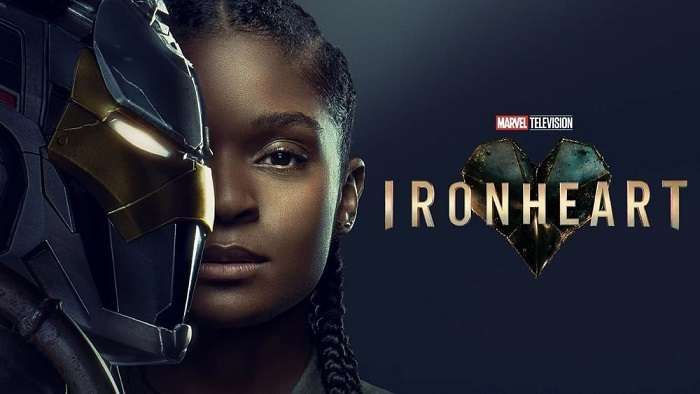Thunderbolts*: Breaks the Marvel Mode - And the Silence
- Eris Grey

- May 26, 2025
- 6 min read
Updated: Jun 27, 2025
Thunderbolts
Director: Jake Schreier
Writers: Eric Pearson, Joanna Calo, Kurt Busiek
Cast: Florence Pugh, Sebastian Stan, Julia Louis-Dreyfus, Lewis Pullman, David Harbour, Wyatt Russell, Hannah John-Kamen
A new era of the MCU is upon us, and this one has the antiheroes, and it’s well worth it. Florence Pugh leads a fantastic cast away with a bold departure from the classic tropes of superheroism we have seen in the past 17 years in the Universe. While there is a display of immense power, the story lies within the who Marvel Cinemati very real human band together to tell it.

Thunderbolts* is a story about grief. It’s groups together misfits, the outcasted heroes and mercenaries that would never fit into a hero agenda: Yelena Belova and her father, Alexei (played remarkably by Florence Pugh and David Harbour), Ghost / Ava Starr (Hannah John-Kamen), John Walker aka secondary Captain America (Wyatt Russell) and eventually, Bucky Barnes (Sebastian Stan). They come together on a mission, a top-secret infiltration of Valentina’s operative base to take out a thief of documents—except they don’t realize each one has been sent to kill the other. They quickly realize they need to work together to survive, and thus create the basis of the film: emotional depth over spectacle, pyschological scars of wrongdoings and the haunting of choices in their lives, and battling inner demons.

Florence Pugh delivers a compelling and intricate performance as Yelena; there’s no doubt about her skills as a trained killer, and she easily portrays her character with a new sense of vulnerability and resilience with nuance. She was believable in that a woman would be suffering from self-medication and depression over years of living a life forced onto her, and her humanity that lies within her shines through as she spends parts of the movie being embarassed by her father and having a difficult time admitting she didn’t want to live life alone anymore. David Harbour was hilarious, the Red Guardian serving as both the comic relief to an otherwise powerful film and the emotional glue to a team that hesitated to admit they were one. Framed as a man out of time and purpose, his vulnerability and need for human connection are framed through well-timed jokes and outward affection of his daughter. He is a clown and a caretaker, a fool and a fighter. Sebastian Stan never fails as Bucky Barnes, he through a series of events becomes the teams reluctant leader, continuing his redemption arc post The Falcon and the Winter Solider, but now instead of the character that harbours darkness, he carries them throughout it. John Walker returns with his disgraced image of Captain America, at first pretending he has it together, then quickly haunted by the downfall of his life, we realize the façade he puts on to cope with his loss of both his role and his family. Ghost / Ava is given more room to connect with depth in Thunderbolts*, we see brief moments of understanding the pain she had to endure as a test subject, and while there were no call-backs to her life, it’s easy to see there is more for this character.
In Thunderbolts*, we are introduced to Bob. At first, he is portrayed as a weak man, but is the quiet axis to the film. This is not a legacy character weighed down by the history of the MCU, nor is he a villain in the standard tones that villains are set in. He’s not a hero, he’s not an anti-hero. He’s something new. He is defined by what was done to him, and while most villains think they are doing the right thing, Bob understands that the dark side of him is deeply powerful. Bob’s the result of a super-serum not unlike that of Captain America or the Winter Soldier; his powers, while subtle at first, are the result of poisoning one with lies, to prey on the weak in experiments to see what they can create. He can fly. He has super strength. He’s bulletproof. He’s psychic. He can bend reality, but what he truly is is someone who can manifest what is happening internally. There’s no traditional threat of villainy here, only an outward expression of struggle, unravelling by the weight of trauma, isolation and addiction. He is a symbol of systemic exploitation, not a human but something that can be turned off, which Valentina showed him firsthand when she “switched him off,” causing his darkness to completely take over.

I have functional depression. I’ve always described it to those who don’t understand that when the depression hits, it feels like I am being shrouded in a blanket, but not a blanket that brings any comfort. One that suffocates, a shadow that’s draped over me with no room to breathe. To see this represented in the way it was took my breath away. It is so rare to see mental disorders done respectfully for the audience to understand, it’s even more rare for the writing to make an impactful stance on how to cope with the disorders. The notion of unity, love, and connection in this movie was beautiful. Even after being defeated, it was never the team's mission to kill Bob, but to reach him, to sit with him during his pain—to see him as a human instead of a target.
Reading this after Ironheart came out? Read our review of that show here.
His presence reframes superhero films into a perspective of care rather than conquest, and it forces audiences to question what we think is dangerous and why.
Mental health is what drives the plot of Thunderbolts*. While it’s full of well-done, action-packed sequences and top-tier jokes, it’s easy to see that the focal point of the film is based on finding a way to heal through trauma, and learning that this healing is often not done alone, and we don’t get to choose who helps us get through it. Bucky Barnes has the burden of his memory, Yelena and Alexei have forced identity and familial trauma, and Ghost has detachment, both physically and mentally. John Walker has a moral disorientation, and Bob is the tipping point of all of it. There’s nothing villainous about Bob when we meet him, but we can tell he’s unwell, and this story shouts the question: What do we do with people who are suffering in ways we do not understand? Do we cast them aside? Control them? Or do we choose to protect them, to love them, to be there for them?
Andrew Droz Palermo knew what he was doing with the visuals here. They are a sharp break from the near-glossy sheen of most MCU films and shows. The palette is very monochrome, the costuming is with muted colours to match the tone of the film. There are no bright beacons of hope here, the film looks as tired as the cast. The framing is subtle, there are hints of fractures in the film. The lighting varies from one member to another. Son Lux does well with the composition. Silence is prominent in this film. Sounds drop into most of an atmospheric dread rather than the resounding reverberation we usually get with Marvel films.
It’s no secret that, except for a couple of movies and TV shows (looking at you, Loki) that the MCU has been suffering since End Game. The characters were drawn out, tired, and the stories were repeats of the same old ones. We needed something new, and Thunderbolts* delivered it to us. A new era of heroes, ones that save rather than battle. There’s no easy answers in this film, no triumphant ending. It’s a breath of honesty, and a hope that if you were to feel the darkness inside you, that someone is willing to sit with you through it.
Frequently Asked Questions
Q: What makes Thunderbolts different from other MCU films?A: Thunderbolts departs from Marvel’s typical bombast, focusing instead on silence, grief, and moral ambiguity. It's more grounded and emotional than most ensemble entries.
Q: Is Thunderbolts connected to the events of Black Widow or Falcon and the Winter Soldier?A: Yes. It draws directly from those stories, especially in how it handles legacy, guilt, and the fallout of manipulation.
Q: Who stands out in the cast?A: Florence Pugh’s Yelena is a centerpiece, but it’s the ensemble’s shared grief and silence that creates the real power.
Q: Is this movie suitable for new Marvel viewers?A: It helps to know the background, but the emotional core is strong enough to resonate even if you're new to these characters.


Comments